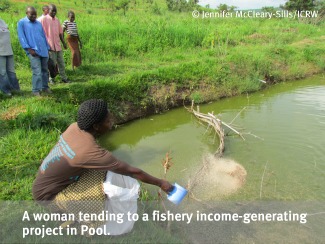
Laying down arms, picking up the pieces
Media Contact
Although the conflict in the Republic of Congo officially ended almost a decade ago, the tough business of mending broken lives is still underway. As is true in many wars, women’s lives were deeply affected.
The conflict that raged through the Republic of Congo for more than a decade, unnoticed by most of the world, destroyed homes, schools, government buildings, crops and roads. The fighting between government forces and militias left thousands dead and hundreds of thousands displaced. In the wake of this destruction, families faced starvation, violence, social exclusion and disease. As in many wars and civil conflicts, women bore the brunt of this.

I traveled to the Republic of Congo (often referred to as ‘Congo-Brazzaville’ and not to be confused with its eastern neighbour, the Democratic Republic of the Congo) recently with my colleague Katherine Fritz, ICRW’s Director of Global Health. We saw firsthand some of the lingering effects the war has had on communities, and in particular, on the lives of women there.
Although the conflict officially ended almost a decade ago, the tough business of mending broken lives is still underway. This requires much more than combatants laying down arms when the very fabric of society is so badly frayed. The United Nations Interagency Working Group on Disarmament, Demobilization and Reintegration (DDR) hired us to investigate how to make their programs more responsive to the gender-specific and HIV-related needs of beneficiaries. In Congo-Brazzaville, this means working with the program that for the past 12 years has been helping the communities most deeply affected by violence get back on their feet, and back to healthy lives.
During the civil war here, sexual violence became more widespread, and anecdotal evidence suggests that the women who suffered such violence are unlikely to have received any medical, psychological, or legal support. Evidence from a growing body of literature also shows that people are more likely to become infected with HIV as a result of war.
However, in the Republic of Congo, providers at HIV testing and treatment sites do not ask patients if they were raped. Nor do they question patients about other potential health risks they may have experienced during the conflict, such as unprotected consensual sex, poor nutrition, and limited access to clean water. This combination of factors increases the social, economic, and physical vulnerability of all members of society – women, children and men – working to rebuild lives derailed by civil war. And it puts them at greater risk of enduring persistent poverty and health problems.
Meanwhile, about 5,000 ex-combatants in Pool have not yet fully reintegrated into society and have little social support. They don’t have any viable job options. And few services are available to meet their health and psychosocial needs.
It’s because of this demanding landscape – one that must meet the needs of both civilians and ex-combatants – that the next phase of DDR programming in the Republic of Congo will face unique challenges related to gender and HIV. But it’s also a landscape ripe with opportunity to do it right. I will be helping the new project do just that when I return to Brazzaville and Pool in late February to advise our UN partners on how to best measure their success at reintegrating the men and women into society according to their unique needs. This is one among many critical steps on the road to picking up the pieces of their lives disrupted by the conflict.
